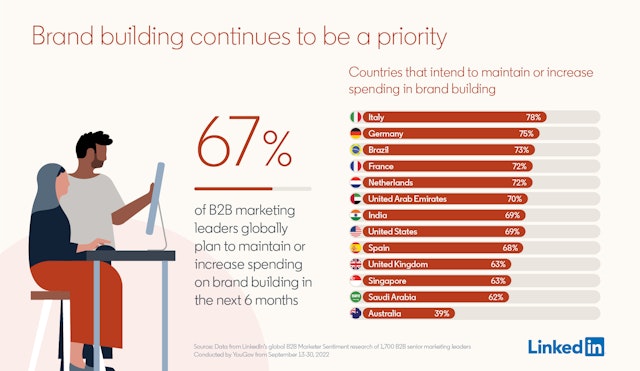B2B marketers see optimism in long-term brand-building
B2B brands are more determined to maintain their marketing spend than their B2C counterparts, according to research from LinkedIn. The Drum explores.

Optimism varies by country, but overall B2B marketers are more hopeful around marketing plans than B2C / Ahmed Zayan
Ahead of B2B World Fest tomorrow, The Drum dug into research that shows that B2B marketers appear to appreciate brand-building more than their B2C peers and will continue spending during the cost of living crisis.
Despite a demonstrable impact on budgets, brand-building remains a priority with two-thirds (67%) of senior B2B marketers. That cohort reports planning to maintain or increase their spend in this area, even as tough financial conditions begin to bite.
According to LinkedIn’s global B2B marketer sentiment study, the core reasons to continue spending are because they believe a strong brand supports long-term sales (52%), and because it helps brands stay top of mind for buyers (42%). Meanwhile, over a third (38%) say that it helps them to attract talent.
Tom Pepper is senior director of EMEA and LATAM at LinkedIn. He says B2B marketers tend to have an eye on the longer term: “It’s a long sales cycle – there is an entire buying community around it. You have to build trust over time in the category you operate within. It’s a big decision for a company to buy CRM technology or whatever it might be, so that continuation of brand messaging at a time when there’ll be a lot of pressure on short-term results is really important.”
He states that digital spend plays a “really critical role natively” due to the fact it is possible to measure its effectiveness. However, for the longer term, he states that LinkedIn has seen an increase in the amount of video and thought leadership-led marketing, noting that “research and thought leadership really do surface during this particular sort of cycle.”

Despite that, demonstrating the efficacy of marketing spend remains a challenge for B2B marketers. Globally, the respondents said that measuring campaign effectiveness and proving ROI of marketing investments (21%) is their biggest challenge.
Overall, 76% of the respondents said they are optimistic about their marketing strategies over the next six months. Pepper attributes that optimism to a growing recognition of the value of committing to investing in technology, talent and brand story over periods of economic uncertainty. He says: “There’s a growing confidence [around] the importance of marketing in a cycle like this, and therefore building a tech stack to support that, to demonstrate the impact of not only lead generation goals, but also winning market share against your competitors.”
Varying optimism
Notably, however, while optimism was highest in countries including India and Brazil, the UK and Germany were outliers at the other end of the table. Confidence among UK B2B marketers around the next six months stood at 56%, while 50% of marketers in Germany felt positive about their plans. Pepper attributes that to the exposure of European companies to the war in Ukraine, in addition to challenges in inflationary pressures.
Tom Stein is chairman and chief growth officer at Stein IAS. He notes: “During the pandemic, B2B brands outperformed consumer brands and were a driving force in sustaining and growing the economy. During this period of uncertainty, the macros are different – inflation, challenging financial markets, the war – but B2B brands will continue to outperform.
“One of the critical keys is to optimize investment in creating future demand while at the same time harvesting existing demand. It takes a strong brand to do this, and a smart interlock of brand and demand activities and investment.”
Beyond the next six months, the picture is obviously less certain. Despite difficulties with long-term forecasting, Pepper argues that investments B2B companies have made in the past can help B2B marketers ride out instability: “If you think of the talent flow that is going into organizations ... [and] if you look at some of the most successful IPOs in the last three or so years, those are almost exclusively B2B businesses.”
Uncertainty in and around Europe is having a cooling effect on the confidence of brands. For B2C brands with short sales and development cycles, that could precipitate a huge drop in marketing spend as they hunker down to weather the storm. The naturally longer-term approach to sales in the B2B world, then, is buoying confidence and creating a new behavior related to long-term brand-building.

